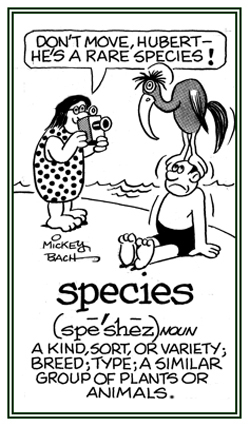Birds are not a species; however, robins, bluejays, sparrows, etc. are.
Generally speaking, all members of a species look and behave similarly in all important respects and can breed among themselves.
Normally, breeding between members of different species does not occur in nature.
Groups of organisms, minerals, or other entities are recognized as being distinct species from each other.
According to some biologists, there are approximately 8,000 species of ants.
It has been estimated that between five and thirty million different species of organisms live on the Earth.
Such groups as the vertebrates (fishes, amphibians, reptiles, mammals, and birds) and flowering plants have relatively fewer species, numbering only in the hundreds of thousands; while insects account for the greatest number of all of the species which exist.

Go to this Word A Day Revisited Index
so you can see more of Mickey Bach's cartoons.

2. In ecology, a species of an animal or a plant which is not in immediate danger of becoming extinct, but that is the topic of protective regulations or conservation measures because of its limited population and distribution.
